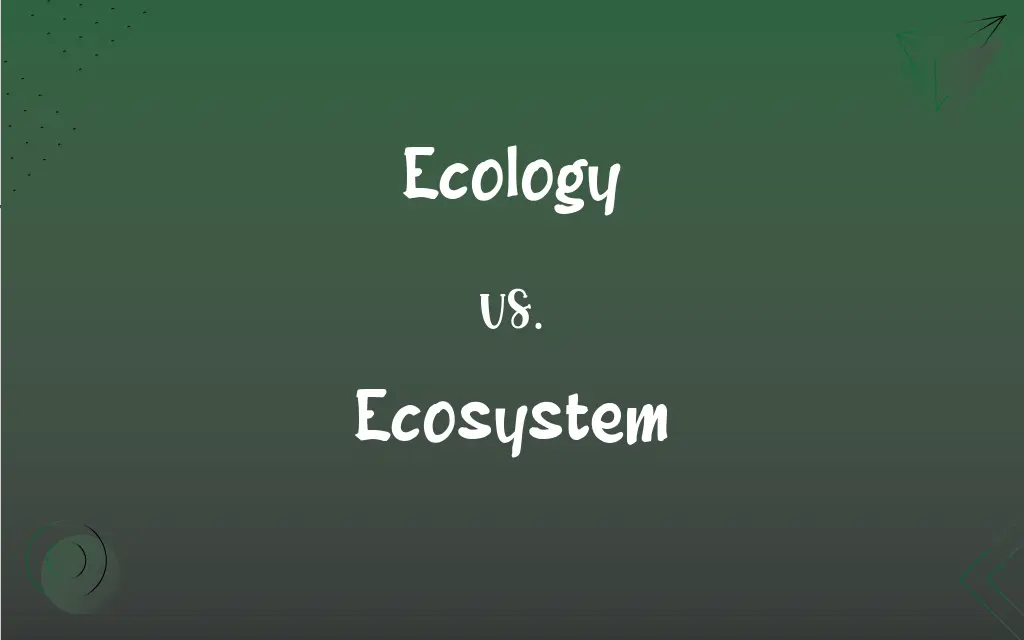Ecology vs. Ecosystem: What's the Difference?
Edited by Harlon Moss || By Janet White || Published on December 25, 2023
Ecology is the scientific study of interactions among organisms and their environment, while an ecosystem is a community of living organisms interacting with their physical environment.

Key Differences
Ecology is a branch of biology focusing on how organisms interact with each other and their environment. In contrast, an ecosystem refers to a specific environment and the interacting organisms within it.
Ecologists study relationships within ecosystems, including food chains, energy flow, and organism behaviors. An ecosystem encompasses both the living (biotic) and non-living (abiotic) components of an area.
Ecology provides insights into the functioning and balance of ecosystems, examining how various factors affect them. Ecosystems can vary in size from a small pond to an entire forest, each with distinct characteristics and dynamics.
In ecology, research methods range from field studies to controlled experiments. Each ecosystem is unique, defined by its particular combination of flora, fauna, and environmental conditions.
The principles of ecology are applied in conservation and environmental management. An ecosystem's health and sustainability depend on balanced interactions and resources, affected by both natural and human-induced changes.
ADVERTISEMENT
Comparison Chart
Definition
Scientific study of organism interactions and environments
Community of organisms interacting with their physical environment
Focus
Interactions, relationships, and processes
Specific community and its environment
Scale
Broad, can study multiple ecosystems
Specific to a particular area or community
Components
Includes research, theory, and application
Comprises biotic and abiotic elements
Application
Used in environmental management and conservation
Specific ecosystems are managed and conserved
ADVERTISEMENT
Ecology and Ecosystem Definitions
Ecology
Conservation Science.
Ecology guides conservation efforts by understanding species interactions.
Ecosystem
Interaction of Life with Environment.
The Amazon rainforest ecosystem is a complex interplay of species and climate.
Ecology
Ecosystem Dynamics.
Ecology helps explain the dynamics of rainforest ecosystems.
Ecosystem
Habitat and Organisms.
The freshwater ecosystem supports diverse aquatic life.
Ecology
Study of Interactions.
Ecology explores how different species interact within an ecosystem.
Ecosystem
Community of Organisms.
A coral reef ecosystem includes various marine species.
Ecology
Environmental Science.
Ecology is crucial for understanding environmental changes.
Ecosystem
Biological Network.
In an ecosystem, food chains illustrate energy flow.
Ecology
Biological Relationships.
In ecology, the relationship between predators and prey is vital.
Ecosystem
Natural Unit.
The Arctic ecosystem is characterized by its cold climate and unique wildlife.
Ecology
The science of the relationships between organisms and their environments.
Ecosystem
An ecological community together with its environment, functioning as a unit.
Ecology
The relationship between organisms and their environment.
Ecosystem
A system formed by an ecological community and its environment that functions as a unit.
Ecology
See human ecology.
Ecosystem
The interconnectedness of organisms (plants, animals, microbes) with each other and their environment.
Ecology
(biology) The branch of biology dealing with the relationships of organisms with their environment and with each other.
Ecosystem
(by extension) A network of interconnected people or organisations that resembles a natural ecosystem due to the complex interdependencies.
The company’s ecosystem mainly comprises its supply chain, customers, end consumers and competitors.
Ecology
The branch of biology concerned with the various relations of animals and plants to one another and to their surrounding environment.
Ecosystem
A system formed by the interaction of a community of organisms with their physical environment
Ecology
The environment as it relates to living organisms;
It changed the ecology of the island
Ecology
The branch of biology concerned with the relations between organisms and their environment
FAQs
What does ecology primarily study?
Ecology studies the interactions among organisms and their environment.
Does ecology contribute to climate change research?
Yes, ecology is crucial in understanding and addressing climate change.
Can an ecosystem be man-made?
Yes, ecosystems can be natural or man-made, like a garden.
Can ecology help in biodiversity conservation?
Yes, ecological studies are fundamental to biodiversity conservation.
What's an example of a large ecosystem?
The Amazon rainforest is an example of a large, complex ecosystem.
How large can an ecosystem be?
Ecosystems vary in size from small ponds to entire forests or oceans.
How do humans impact ecosystems?
Humans can impact ecosystems through activities like pollution, deforestation, and urbanization.
How does ecology affect environmental policy?
Ecological research informs policies for sustainable environmental management.
Are ecosystems static?
No, ecosystems are dynamic and constantly changing.
Is ecology only about animals?
No, ecology includes the study of all living organisms.
How do ecosystems maintain balance?
Ecosystems maintain balance through cycles, food webs, and energy flows.
Is the study of ecology growing in importance?
Yes, with environmental challenges, the importance of ecology is increasingly recognized.
Are all parts of an ecosystem equally important?
Yes, all parts, whether biotic or abiotic, play crucial roles in an ecosystem.
Can ecosystems recover from disturbances?
Many ecosystems can recover, but the extent and rate vary greatly.
What role do humans play in ecology?
Humans are both study subjects in ecology and influencers of ecological processes.
How does ecology relate to evolution?
Ecology and evolution are interrelated, as ecological interactions can drive evolutionary changes.
Can two different ecosystems merge?
Yes, ecosystems can merge or overlap, creating transitional areas or ecotones.
Can technology be used to study ecosystems?
Yes, technology like satellite imagery and GIS is used to study ecosystems.
Is ecology a multidisciplinary science?
Yes, ecology integrates aspects of biology, geography, chemistry, and more.
What is the smallest ecosystem?
Small ponds or even microhabitats like a fallen log can be considered small ecosystems.
About Author
Written by
Janet WhiteJanet White has been an esteemed writer and blogger for Difference Wiki. Holding a Master's degree in Science and Medical Journalism from the prestigious Boston University, she has consistently demonstrated her expertise and passion for her field. When she's not immersed in her work, Janet relishes her time exercising, delving into a good book, and cherishing moments with friends and family.
Edited by
Harlon MossHarlon is a seasoned quality moderator and accomplished content writer for Difference Wiki. An alumnus of the prestigious University of California, he earned his degree in Computer Science. Leveraging his academic background, Harlon brings a meticulous and informed perspective to his work, ensuring content accuracy and excellence.






































































